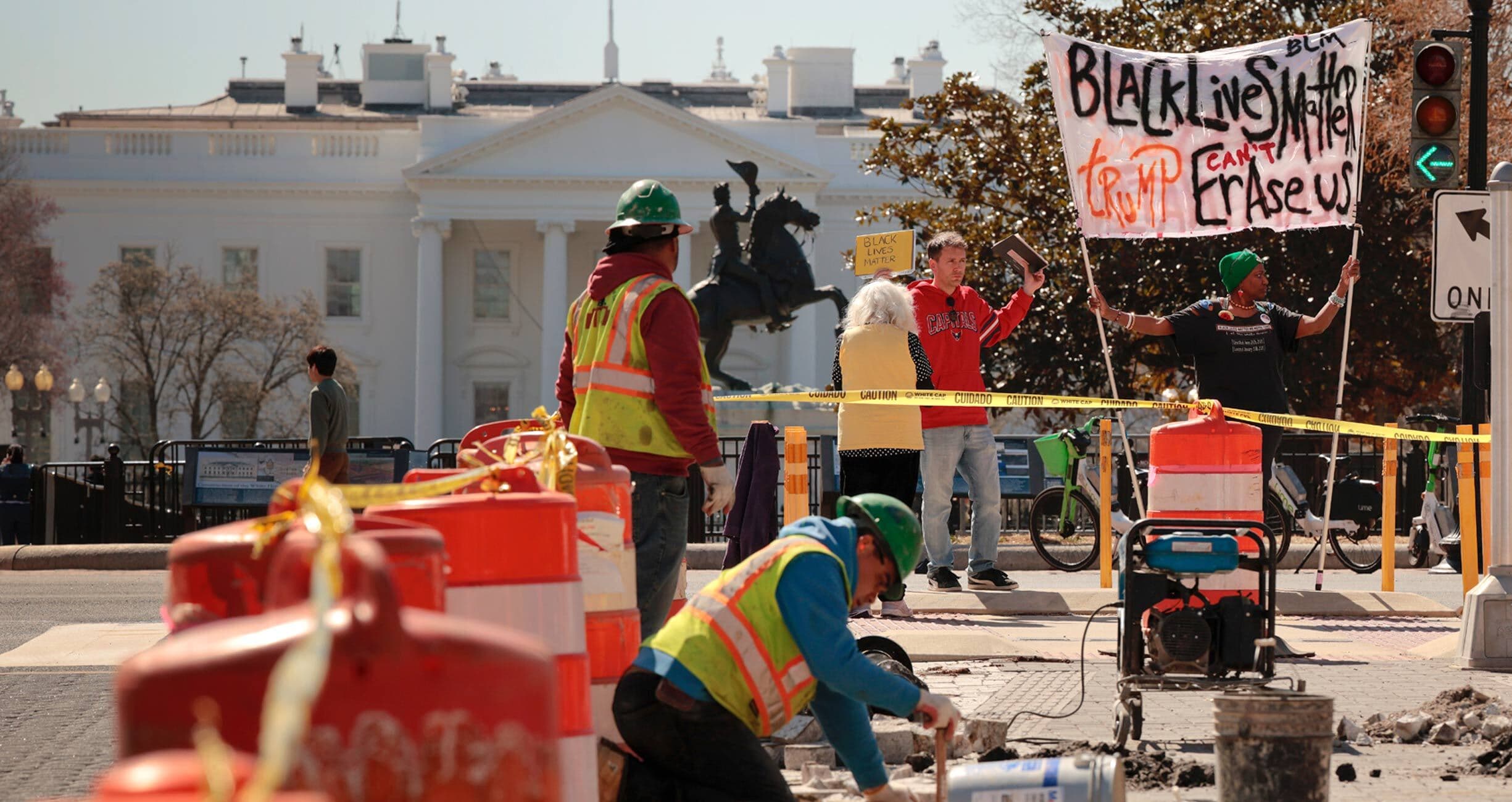Five Years After George Floyd’s Murder, What’s Changed?
The fight for true safety and justice continues.
This past March, government employees used a jackhammer and pickaxe to destroy the mural painted on a street near the White House in the wake of George Floyd’s murder. A woman stood by watching with a hand-lettered “Black Lives Matter” sign, in a silent protest of those same words being torn up out of the concrete in Washington, DC. “It was important for me to come out today,” she said.
President Trump, who calls the phrase “Black Lives Matter” a “symbol of hate,” has also taken a jackhammer to basic police accountability. In April, he issued a seven-section executive order “unleashing” law enforcement to cause harm without consequences. This month, four days before the anniversary of Floyd’s murder by Minneapolis police officer Derek Chauvin, the administration scrapped agreements for federal oversight of police departments in Minneapolis, Minnesota, as well as in Louisville, Kentucky, where Breonna Taylor was killed in a botched police raid.
The Trump administration has also revoked President Biden’s directive on policing reforms and eliminated a database that helped prevent officers with histories of serious misconduct from moving to other departments. Following these extreme actions, the administration decimated the Department of Justice’s (DOJ) civil rights division and cut more than $800 million in DOJ grants—which funded programs that both prevented crime and served survivors of crime. Together with peer organizations, we have sued over this illegal act.
As harmful as these actions are, they cannot erase all the strides made in recent years nor crush the spirits of the many people who continue to believe in safety and justice for all. As we approach the fifth anniversary of George Floyd’s murder, we remember the millions of people across every state and in dozens of countries who showed up to protest a policing system that commits unnecessary violence, disproportionately against Black people. We remain committed to uprooting the racism that pervades the criminal legal system and makes true safety and justice impossible.
Progress has been made. Between 2020 and 2021, states passed more than 140 law enforcement oversight bills intended to increase police accountability and place limits on their use of force. This month, Minneapolis Mayor Jacob Frey said he plans to enforce the reforms limiting police use of force that were adopted after Floyd’s murder, despite the withdrawal of planned federal oversight. Other local leaders should follow his example.
Across the country, an increasing number of jurisdictions are developing civilian-led crisis response programs as alternatives to armed police. Staffed by unarmed teams of mental health clinicians, peers, and other specially trained civilian responders, these programs are demonstrating that they can safely act as an alternative to police for people in crisis.
Polling shows that people support new solutions that avoid making police the default solution for societal issues, ranging from kids skipping school, to mental illness, to homelessness, to gun violence. Strategies that “fund things that are proven to create safe communities and improve people's quality of life, like good schools, a living wage, and affordable housing, and do more to prevent crime by increasing treatment for mental health and drug addiction and getting illegal guns off the street” are more popular with voters than the “tough-on-crime” approach that calls for more police and prisons. Increasingly, people can see that safer communities start with respectful working relationships between police and the people they serve, systems that hold law enforcement accountable, and investments in programs that prevent crime before it can happen rather than simply respond in its aftermath.
Washington, DC’s Black Lives Matter mural will be replaced with artwork honoring the 250th anniversary of the founding of the United States. For 250 years, our country has seen cycles of progress and backlash in the fight to build systems that treat all people fairly. Let us not forget the millions who protested, who risked arrest, and to this day show up for our rights in the wake of George Floyd's murder. They are still out there, across all corners of the earth, from Mexico to Australia, from small towns in Iowa to United States metropolises. Though the George Floyd Justice in Policing Act stands little chance of passage under the current president and Congress, leaders must continue to fight for better and more accountable policing.
To be sure, the transformative change we hoped for in the wake of Floyd’s death has not yet materialized. So much work remains and will be challenging in the current climate. But the fight for true safety and justice for all people continues. It must.
